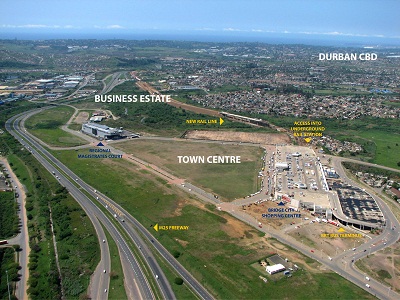Property Development - Bridge City on the Move with Durban’s R20 billion Public Transport Upgrade
Bridge City, the mixed use commercial / residential Town Centre and Business Estate to the north of Durban which is set to attract R10 billion in public and private sector investment, will play a pivotal role in the development of the city’s R20 billion public transport system, making it perfect for businesses looking for a prime position and highly accessible location along the rapidly developing northern coastal corridor.

An aerial photograph of Bridge City showing the new railway line which is under construction.
Speaking in the wake of the release of the 17 hectare Bridge City Industrial Business Estate, Cyril Gwala, Tongaat Hulett’s Development Director responsible for Bridge City, the River Horse Valley Business Estate and Cornubia, said that land released for development was optimally located just 17 kilometres from the Durban port and 23 kilometres from the King Shaka International Airport. It was expected to contribute towards lessening the shortage of serviced, industrial land in Africa’s most rapidly growing city.
In addition, Bridge City has been identified as a key node in the much anticipated R20 billion Integrated Rapid Public Transport Network (IRPTN), that is founded on the Bus Rapid Transport (BRT) system, recently announced by the eThekwini Municipality. This world-class public transport network will integrate bus, rail and taxi transportation, providing reliable and affordable commuter transport that will benefit residents, workers and businesses.
The first phase of the public transport project comprises of three BRT routes and a rail corridor, giving commuters three routes from which to choose between the eThekwini region and Bridge City. Overall, the new transport system is expected to connect 600 000 commuters across the city to nine public transport corridors. The BRT routes are expected to connect commuters from Bridge City to Durban Central, Pinetown, Cornubia and Umhlanga.
As part of the first phase of the city’s transport development plan, dedicated bus and taxi lanes, pedestrian walkways, bus shelters and feeder routes will be built around Bridge City as well as the Durban City Centre, Pinetown, Umlazi and Umhlanga. Gwala said that a four hectare site within the Bridge City Business Estate has been sold to the City of Durban for its new BRT depot.
The railway line, which is of strategic importance as it provides railway passengers with a link between the Bridge City development and the rest of Durban, will be complete by the end of November 2013. All parts have been installed and it has been tested with a locomotive. It is expected to be commissioned between December 2013 and January 2014.
It is anticipated that, once Bridge City is fully developed, the rail station alone will accommodate approximately 100 000 commuters daily, making it the second busiest station in KwaZulu Natal.
There are also plans to upgrade the road network around Bridge City. eThekwini Municipality and Tongaat Hulett intend constructing a new half diamond interchange off the M25 which will give dedicated road access to the Bridge City development and to KwaMashu. The M25 will not only accommodate buses via a dedicated bus transport route, but also open the way for other vehicles to travel to and from Bridge City.
This is expected to attract not only logistics and distribution centres but also labour intensive businesses such as call centres as Bridge City will be easily accessible to workers not only from surrounding areas such as Inanda, Ntuzuma and KwaMashu (INK) but also from further afield. Ramped up commuter transport is also expected to facilitate further development of Bridge City as a retail hub and accelerate the planned development of residential and office blocks opposite the Bridge City Shopping Centre and Magistrate’s Court. More efficient transport will also assist professionals and patients utilizing the new R1,2 billion, 450 bed regional public hospital which is expected to be constructed at Bridge City over the next few years.
Gwala said that the Bridge City Shopping Centre, which opened in 2009, has already extended its pool of shoppers from the immediate vicinity to outlying areas. As a result, the mall is expected to add more big retail brands to its mix of national retail tenants. The shopping centre already has a well established taxi rank which will be incorporated into an intermodal facility complete with its own fully fitted out railway station.
The 17 hectare Business Estate is expected to attract a wide variety of investors. The size of sites - which are priced at R1 400 per sq/m of platform area - depend on the topography and the needs of individual investors. The Town Centre sites are priced at R950 per sq/m of retail bulk (subject to a minimum of 1.5 FAR) and R300 per sq/m of residential bulk (these prices are currently being reviewed).
Bridge City is being developed via a public, private sector partnership (PPP) between the eThekwini Municipality and Tongaat Hulett. Tongaat Hulett is the project manager responsible for implementation of the project onto the ground as well as the mandated sales agent for Bridge City.
Distributed by Shirley Williams Communications.






